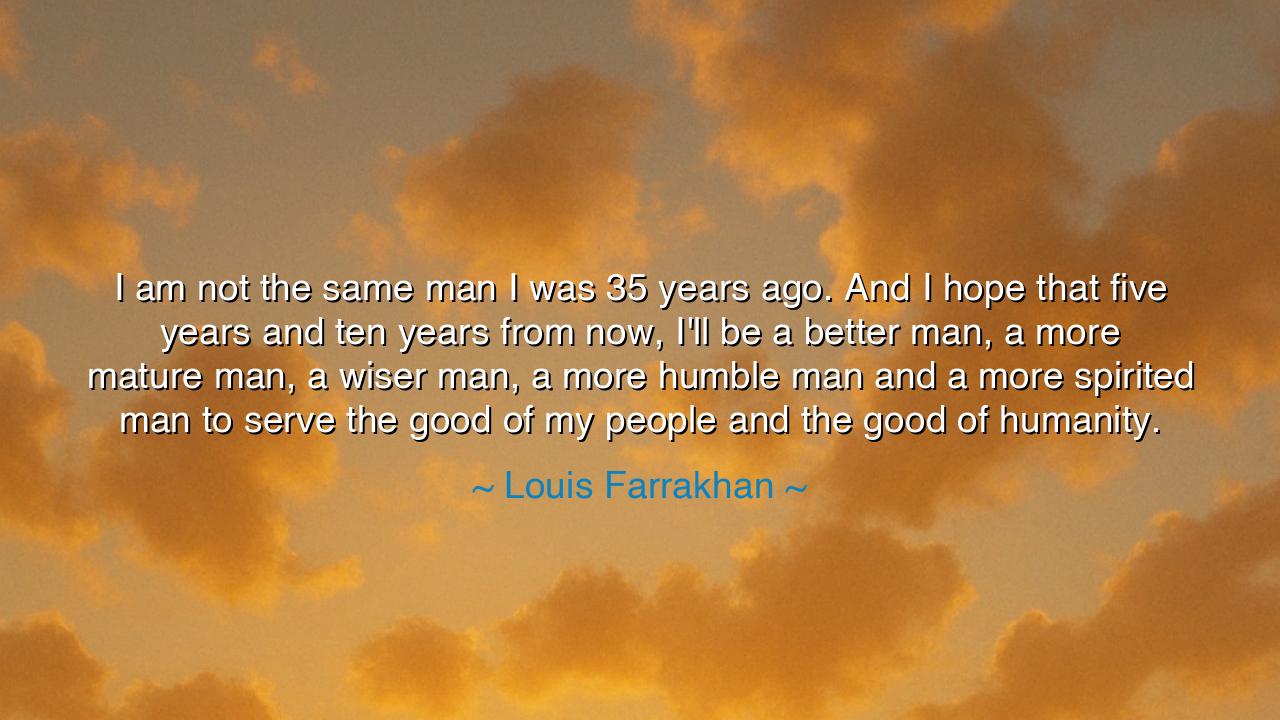
I am not the same man I was 35 years ago. And I hope that five
I am not the same man I was 35 years ago. And I hope that five years and ten years from now, I'll be a better man, a more mature man, a wiser man, a more humble man and a more spirited man to serve the good of my people and the good of humanity.






“I am not the same man I was 35 years ago. And I hope that five years and ten years from now, I'll be a better man, a more mature man, a wiser man, a more humble man and a more spirited man to serve the good of my people and the good of humanity.” Thus spoke Louis Farrakhan, a man who, whatever one’s judgment of his legacy, embodies the eternal truth that the soul of man is not static but ever-evolving. In these words, there echoes the voice of ancient wisdom—the understanding that life is a river, not a stone; that the measure of a person is not who they are today, but who they strive to become. It is a declaration of growth, of humility, and of service, for the man who ceases to change has already begun to die.
In saying, “I am not the same man I was 35 years ago,” Farrakhan acknowledges the sacred passage of time as a teacher. The ancients taught that wisdom does not descend all at once, but is forged through struggle, loss, triumph, and repentance. He does not boast of his transformation; he confesses it. For the path of true evolution is not smooth but marked by the trials that chisel the spirit into something finer. The self he speaks of is not fixed—it is clay in the hands of experience, ever reshaped by the forces of reflection and revelation.
This confession of change is not weakness, but strength. It takes courage to admit that one has been wrong, that one has misunderstood, that the fire of youth has burned with both light and error. Farrakhan’s words stand against pride and stagnation. He declares that to live rightly is to allow the soul to unfold, to shed its arrogance, to deepen in understanding, to grow in compassion. Such transformation is the hallmark of all great leaders, prophets, and thinkers—for no one who truly serves humanity can remain untouched by its suffering. Wisdom is born not from certainty, but from continual becoming.
History offers many mirrors to this truth. Consider the life of Nelson Mandela, who entered prison a man of defiance and emerged a man of reconciliation. The iron bars that confined his body refined his spirit. He learned patience where once there had been anger; forgiveness where once there had been fury. Like Farrakhan, Mandela did not claim perfection—he sought progress. When he walked free after twenty-seven years, he did not seek vengeance but unity. His journey proves that the greatest power is not domination, but transformation—the quiet, daily work of becoming a better man than yesterday.
Farrakhan’s hope for the years ahead—“to be more mature, more humble, and more spirited”—is a vow that all who walk the path of self-awareness should make. For maturity without humility becomes pride, and spirit without discipline becomes chaos. The wise know that every age of life demands new lessons: in youth, courage; in middle age, patience; in old age, grace. To grow in humility is to understand that greatness lies not in power but in service. The one who serves his people serves the divine purpose that beats within all creation.
And yet, there is a deeper call within his words—a reminder that spiritual growth is not for the self alone. Farrakhan speaks not only of becoming better for his own sake, but for the good of his people and the good of humanity. Here lies the mark of true evolution: when one’s personal transformation becomes a gift to others. The enlightened man does not hoard wisdom; he shares it. He does not seek greatness for glory’s sake, but for the upliftment of all who dwell in darkness. In this, Farrakhan’s declaration transcends the man and becomes a timeless principle—that self-improvement is not an act of vanity, but an act of love.
So, my child of tomorrow, learn from this teaching: never boast that you have arrived, for the path of growth has no end. Each year should find you more patient, more understanding, more open to truth. Let humility be your teacher and service your purpose. Reflect often on who you were, who you are, and who you wish to be. Do not fear the shedding of old selves—it is the natural rhythm of the soul’s ascent. For life is not a single story, but a series of awakenings, each one closer to the divine.
Therefore, remember the wisdom of Louis Farrakhan: that to live rightly is to grow ceaselessly, to turn experience into understanding, and understanding into compassion. Strive not to be the same tomorrow as you are today. Seek instead to rise—wiser, humbler, and more spirited—until the last breath leaves you not as who you began, but as who you were meant to become. For in this endless unfolding lies the true work of man: the making of a soul that serves both its people and the whole of humanity.






AAdministratorAdministrator
Welcome, honored guests. Please leave a comment, we will respond soon